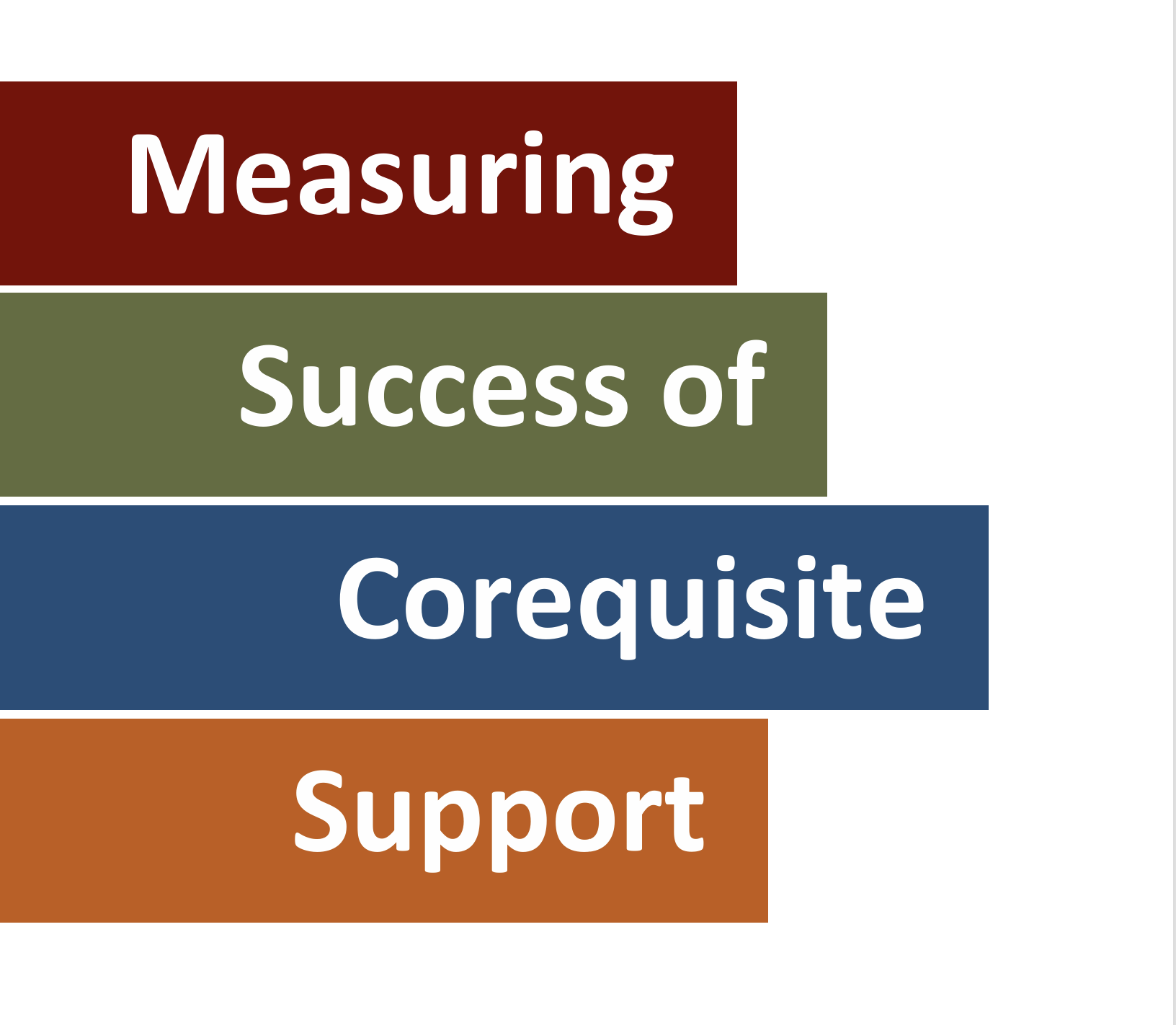Measuring Success of Corequisite Support
Publication Date: 2023
Format: Report (PDF)

This toolkit helps colleges better understand how to evaluate the success of corequisite courses and communicate their value relative to traditional remediation models. It includes concise background information, visual comparisons, and sample data models that illustrate key concepts in clear and compelling ways. Initially developed as an interactive tool, this static version offers institutions a practical framework for defining success, comparing outcomes, and refining strategies as part of broader developmental education reform efforts.
Connections to the Transformation Journey
and How Institutions Transform
Stages of Transformation
- Sharpen the Focus: This resource offers a valuable reconceptualization of what success looks like for incoming students with academic support needs. It is particularly useful for institutions considering the implementation of corequisite remediation and can help clarify how priorities are defined and communicated across reform teams.
- Sustain and Evolve: For institutions actively implementing corequisite models, this resource provides practical guidance for measuring and communicating success over time. It supports policy and practice refinement by offering new success benchmarks that go beyond traditional remediation metrics—such as gateway course completion within a set timeframe.
Learn more about the Transformation Journey and How Institutions Transform.
Evidence-Based Practices
- Developmental Education Reform: This resource focuses on corequisite remediation, a key strategy within the broader evidence-based practice of developmental education reform. It includes background on student attrition in traditional prerequisite sequences and explains why corequisite models are more effective. The toolkit also illustrates how to evaluate these reforms using time-sensitive metrics, side-by-side comparisons, and intuitive visuals offering principles that apply across a range of developmental education strategies.
Learn more about the Transformation Journey and How Institutions Transform.
Core Institutional Capacities
- Strategic Data Use: This resource helps build capacity related to strategic data use by intersecting concrete data use strategies with specific transformational practices. Not only does this strengthen implementation efforts generally, but many teams also find it more intuitive to build core institutional capacities when efforts are done as a part of implementing specific reforms. This resource reflects such an “applied” approach to capacity building related to using data.
Learn more about the Transformation Journey and How Institutions Transform.
Continuous Improvement
This resource is most relevant to the following cross-functional roles:
- Senior Leaders: This resource serves as a helpful reference for senior leaders seeking an intuitive, data-informed way to redefine and evaluate success for incoming students with academic support needs.
- Mid-Level Leaders: Provides practical strategies to help mid-level leaders define success metrics, evaluate progress, and communicate the outcomes of developmental education reforms once implementation is underway.
- Faculty: A useful tool for faculty leaders and instructors looking for an intuitive, data-informed way to redefine and evaluate success for incoming students with academic need.
This resource connects to the following phase(s) of the PRPAM framework:
- Prioritize: Useful for institutions considering developmental education reforms by offering new models for understanding and measuring student success—especially for students entering with academic support needs.
- Monitor: Supports institutions already implementing reforms by providing concrete tools and strategies for tracking, evaluating, and communicating the impact of corequisite approaches on student outcomes.
Learn more about the Transformation Journey and How Institutions Transform.
Stages of Transformation
- Sharpen the Focus: This resource offers a valuable reconceptualization of what success looks like for incoming students with academic support needs. It is particularly useful for institutions considering the implementation of corequisite remediation and can help clarify how priorities are defined and communicated across reform teams.
- Sustain and Evolve: For institutions actively implementing corequisite models, this resource provides practical guidance for measuring and communicating success over time. It supports policy and practice refinement by offering new success benchmarks that go beyond traditional remediation metrics—such as gateway course completion within a set timeframe.
Learn more about the Transformation Journey and How Institutions Transform.
Evidence-Based Practices
- Developmental Education Reform: This resource focuses on corequisite remediation, a key strategy within the broader evidence-based practice of developmental education reform. It includes background on student attrition in traditional prerequisite sequences and explains why corequisite models are more effective. The toolkit also illustrates how to evaluate these reforms using time-sensitive metrics, side-by-side comparisons, and intuitive visuals offering principles that apply across a range of developmental education strategies.
Learn more about the Transformation Journey and How Institutions Transform.
Core Institutional Capacities
- Strategic Data Use: This resource helps build capacity related to strategic data use by intersecting concrete data use strategies with specific transformational practices. Not only does this strengthen implementation efforts generally, but many teams also find it more intuitive to build core institutional capacities when efforts are done as a part of implementing specific reforms. This resource reflects such an “applied” approach to capacity building related to using data.
Learn more about the Transformation Journey and How Institutions Transform.
Continuous Improvement
This resource is most relevant to the following cross-functional roles:
- Senior Leaders: This resource serves as a helpful reference for senior leaders seeking an intuitive, data-informed way to redefine and evaluate success for incoming students with academic support needs.
- Mid-Level Leaders: Provides practical strategies to help mid-level leaders define success metrics, evaluate progress, and communicate the outcomes of developmental education reforms once implementation is underway.
- Faculty: A useful tool for faculty leaders and instructors looking for an intuitive, data-informed way to redefine and evaluate success for incoming students with academic need.
This resource connects to the following phase(s) of the PRPAM framework:
- Prioritize: Useful for institutions considering developmental education reforms by offering new models for understanding and measuring student success—especially for students entering with academic support needs.
- Monitor: Supports institutions already implementing reforms by providing concrete tools and strategies for tracking, evaluating, and communicating the impact of corequisite approaches on student outcomes.
Learn more about the Transformation Journey and How Institutions Transform.
Recommended Citation: Complete College America (2023). Measuring success of corequisite support. Strong Start to Finish.

